Batting Deficiency: Main Cause for Less Fun in Baseball
By
John Paciorek
It is no secret in the Big Leagues – unless you are a pitcher or the “slickest” of fielders with a rifle-arm and “speed-a-foot,” your chances of making it to the “Show” and staying there are “slim and None” if you can’t HIT! But most batters who had been signed to play professional Baseball had been thought of by their parents and “home-town” fans as decent hitters at one time or another.
Ted Williams exclaimed it first, but probably many before him realized the fact, and, assuredly, every athlete who has been privileged to experience the physical, mental, and emotional tension associated with swinging a baseball bat under game conditions can verify, “Hitting a baseball effectively is the most difficult thing to do in all of sports.” 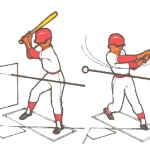
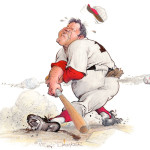
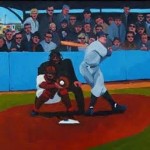
Many people, men, women, boys, and girls love to swing a baseball bat at a baseball (softball). It seems a pretty fair accomplishment—mentally sizing up the speed of that spherical object floating in a relatively straight path toward a designated area for the “batter” to physically strike with a long narrow cylindrical piece of wood or aluminum. It’s really fun! The skill involved is not just physical; the mental aspect includes the quick discernment of time, space, and geometric calculations, (and much more intense at the Big-League level). That’s why baseball (softball) games at family picnics and other recreational environments are such crowd-pleasing activities. And if no one gets hurt, it’s even more enjoyable!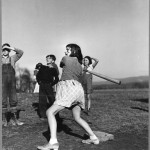
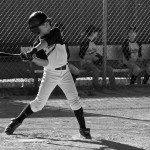
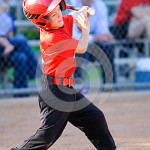
For those who get involved at a more intricate level, like Little League, the game speeds up a little bit. The batter doesn’t seem to have as much control, as when dad or mom was pitching the ball. But the game is still fun; you just have to take it a little more seriously, more figuring and adjusting to more variables. And when your bat makes “good contact” the exhilaration is more intense and meaningful, even though your hard hit grounder goes through the shortstop’s legs for a base hit.
When you make it to Little League Majors, the pressure can almost seem too daunting. Everyone is bigger and stronger. You start asking yourself, “how am I going to maintain my .850 average? Then reality sets in, and more adjustments (physically, mentally, and emotionally) have been made, and you feel pretty grateful to sustain a modest .530 batting average. The .320 drop is attributable to the “curve ball”!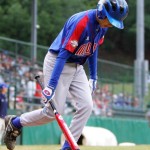
As a thirteen year-old, in Pony League, you’re now playing on a field where the bases are 23 feet farther, and the pitching rubber is 54 feet from home plate, instead of 45. Mental and physical adjustments have to be made! The pitching distance is farther; but the pitcher is bigger and stronger; and the ball is thrown faster, and it “hurts” a lot worse. (Remember, this is where your most imaginative 14 year-old pitcher starts to work on his “split-finger,” and assortment of other pitches, for which he no doubt will throw his arm out and diminish all chances of making the High School team, and the “Bigs.”) Therefore, an emotional adjustment is in order—“do I really want to play Pony League, or High School Ball?”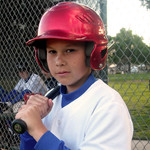
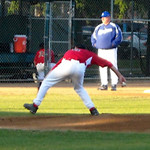

With a year of “Pony” under your belt, you’ve made the necessary adjustments. You’re bigger, stronger, and back in dominating form! New standards have been acquiesced, and your .400 plus batting average is a given. Your size and physical ability give you overwhelming confidence, and the High School coaches reinforce your attitude with constant pandering. Watch, stride, and swing—that’s all you had to do, and pretty good contact with the ball gives you a hit 2 times in every 5 at- bats, every once in a while, a towering home-run. Hitting a baseball doesn’t seem that difficult! Sure, every once in a while, in tournament play, one or two pitchers seem to be overpowering! Should you make adjustments just for them? (You have not yet learned about the Big Fish in the Big Pond syndrome.)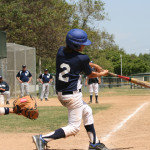
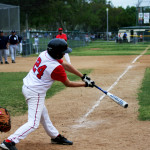
High School provides a whole new experience for the “naïve” hitter. Until now, most instructors of the “art” of hitting have been parents, who didn’t claim to be infallible artisans of the craft but only slightly more than incompetent advisors whose lack of expertise couldn’t do much harm to a blossoming prodigy. Where the Little League coach pampered the players, because his son, daughter and neighbors’ kids were on the team, and didn’t want to risk offending anyone, along with the rule that everyone had to play, the Public High School coach had no such reservations to inhibit his personal, somewhat tyrannical resolve to develop the potential of the players for his team. If you didn’t produce on your own recognizance, you’d better follow his specialized techniques, or risk “riding the pine” for the “duration” of your High School career, while lapsing into baseball oblivion.
During those High School years, the baseball player begins to realize that hitting a baseball consistently well must be the most difficult task in all of sports. Once this realization becomes prominent in the minds of the most determined hitters, an inexplicable desire to challenge the inescapable assumption that mere mortals are incapable of surpassing the pre-determined range of superlative achievement for batting excellence! To ever hit .400 again, on the Major League level, seems impossible, and preposterous to think it could be done on a consistent basis.
After High School, those individuals who go into the college ranks or professional Minor League baseball quickly discover that mere physical enhancement will not entitle players to climb the ladder of developmental success. Even with the greatest of physical attributes, the acts of seeing, striding, and swinging the bat do not always procure the most beneficent effects. Thoughtful consideration of a good many aspects of the entire batting regimen must be understood and applied conscientiously, in order for maximum proficiency to be demonstrated.
The question has been, and might always persist, what is the proper regimen for establishing a technique that will procure the consistent, maximum effect while hitting a baseball? Many have theorized about the prospect, but only a handful have established credibility through their practical applications and thoughtfully spoken and written delineation. But, of these, the closest to extracting a complete and understandable facsimile of truth has been Mr. Ted Williams, who happened to be the last Major League player to bat .400 over the course of an entire season. Unfortunately, those who attempted to understand and follow his astute analysis of hitting perfection, misconstrued his intent, and misguided countless devotees into a darkened abyss of probable incompetence.
Aristotle pointed out, in his Nicomachean Ethics, that, in order to begin a study of anything that would lead to the highest understanding and demonstration of its universal verity, one must “behold” an example of a closest facsimile to the ideal estate, study its admirable characteristics, and extrapolate from its obvious functional proficiency a common entity by which a generic standard could be discerned, duplicated, and possibly expanded upon. Excellence in any field of human endeavor is achievable to anyone willing to devote a “heart and soul” effort toward mastering the definable concomitants to successful enterprise.
Major League batters are at the pinnacle of their vocational pursuits. Yet, within their own ranks can be found distinguishable differences in individual mastery of skills and technique. The batters who would become excellent performers are they who would follow the example of the “martial artist,” by adapting to his study and application of fundamental movement principles. However, the alternative to taking martial arts classes would be to find someone in their own profession, who is renowned as a masterful exponent of their own respective art of batting. In other words, “mark the perfect man, and behold the upright.”
“Upright” does not refer to body-position while performing tasks. The more upright the body, the higher is the center of gravity. That’s not good in most sports situations. A low center of gravity is always preferred for short, quick, and strong movements of the body in all sports activities. Upright, in the biblical context, refers to intelligent, principled thoughtfulness that always precedes masterful behavior or action.
Barry Bonds and Ted Williams are the batters whom all prospective “high achievers” should emulate in order to attain a facsimile of credible “Excellence” and bring the fun back into their respective “hitting-game.”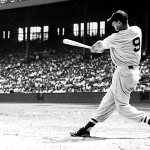
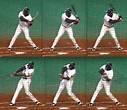
To be continued: Models of Excellence!